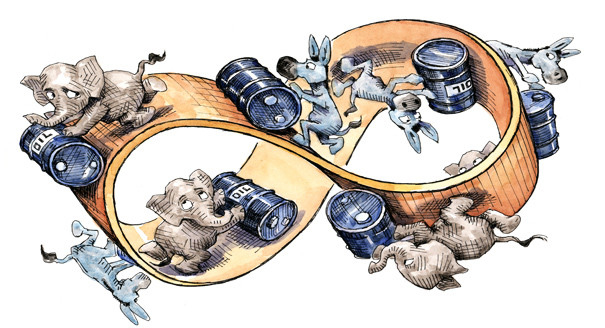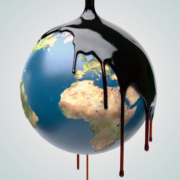HAPPY 50th EARTH DAY – Part 1: The Price of Our Oil Addiction
April 22, 2020 is the 50th anniversary of “Earth Day”, and a good time to reflect on our progress to protect this island chain we call home.
The first Earth Day was a defining moment in the great American experiment. Twenty million people nationwide — at the time, roughly one in 10 citizens — took part.
Last year the Pew Research Center reported that nearly 70 percent of Americans said the government was not doing enough to protect the water quality of lakes, rivers and streams, or to protect air quality. And this year, Pew reported that, for the first time in two decades, a majority of Americans believed dealing with climate change should be a top priority for the president and Congress, a 14-point rise from just four years ago.
Democrats and Republicans worked together to create the Clean Water Act, the Clean Air Act and the E.P.A. Today, the politics of divide and conqueror prohibit that kind of teamwork, which seems all but unthinkable with a GOP controlled Senate.
While research shows that voters’ interest in climate and environmental issues is soaring, it also reveals an astonishing split: More than 75 percent of Democrats called climate change a top policy priority, while less than 25 percent of Republicans did.
At the core of this political tug of war is the Trump administration’s system wide roll back of environmental regulations governing fossil fuels – from extraction to tailpipe and power plant emissions, stop us if your dare. The rollbacks range from weakening or eliminating water and air quality protections to climate change, as well as broader roll-back of laws designed to protect the public health, endangered species, and the environment.
 In contrast to the politics of denial, 50 years of climate science and mounting data continues to document the effects of our energy addiction to fossil fuel and the escalating impact to the planet’s climate, ecosystems, and global species (humans included).
In contrast to the politics of denial, 50 years of climate science and mounting data continues to document the effects of our energy addiction to fossil fuel and the escalating impact to the planet’s climate, ecosystems, and global species (humans included).
It was only a few years ago that energy industry experts believed that renewable energy would never account for than 2-3% energy supply to national grid. By 2018, renewable energy sources accounted for 17% of all electricity generation in the United States.
Progress, yes, but the health and environmental costs from burning fossil fuels to produce electricity continue mount; in FEMA recovery efforts, sea level rise, and public heath costs accountable to polluted air and water, and especially impacting the lives of those in the poorest of communities who live closest to these pollution sources: oil and gas refineries and gas fracking sites.
The Petroleum Plutocrats
Between 1970 and 2018, the global consumption of coal, oil and natural gas more than doubled. As hard as it may be to grasp, global fossil fuel demand continues to rise.
Substantial progress has been achieved in technology and cost competitiveness of wind and solar project energy projects versus legacy fossil fuel power plants, and these clean power replacements are proving to be the most cost effective of energy production options for power producers, utilities, and consumers alike. They deliver greater efficiency, are cheaper to operate, and for the general public, environmentally essential towards addressing global warming in their role as energy source replacements for coal, oil, and gas power plants.
With competitive clean energy replacements banging on their door, and a rising global push back from most of the world’s governments as smokestack and tailpipe climate costs continue to rise, for Big Oil …it’s full speed ahead, global warming be damned.
Major global resource extractors, fossil fuel producers and distributors continue to refine their political calculus, buying favors, and fine tuning their plans for the next 20, 30, 40, even 50 years of operation as the essential component of any energy mix. Their business plans for the future share common themes:
- extend the global economic dependency on oil, gas, and all fossil fuels as far into the future as possible,
- deny the facts and scientific conclusions of global warming,
- obscure the environmental costs and consequences of business-as-usual worst practices, and
- push ahead, no matter what may come of it.
Petroleum Politics – A Global View
In the 21st century, Exxon and their big oil counterparts have been “given” more than just a free hand (alongside the Russians) to open up drilling operations in the Arctic, they have been handily rewarded for their role in a global melt-down that is now making the transformation of the Arctic Sea ready for it transformation into a giant drilling platform for unexplored riches in oil and gas – environmental protections and climate consequences also be damned.
Rachel Maddow’s recent book, “Blowout”, does an excellent job telling the story of how the world’s richest economic sector, subsidized to the tune of more than $5 trillion dollars annually in global taxpayer subsidies (IMF-World Bank data), manages to leverage its influence and profit priorities across the world’s governments, successfully navigating the geo-political landscape to eliminate all public opposition to their plans and activities, while passing the costs onto the public in polluted waterways, public health and environmental costs, and tax-free operations.
The book wonderfully outlines the winners and losers in game of greed and massive petro profits.
In meanwhile, China and Europe are driving demand for Russian natural gas and oil, and India (the most populous place on Earth) is just now coming into their own as a major importer of oil and gas to meet its growing energy demands of its population and economy. There is no shortage in demand for energy, question is in what form that energy is delivered to consumers. When it comes to the established players in fossil fuels, let the good time roll.
In the past 10 years, first beginning with the Obama administration, and then in the last 3 years under Trump, the US has flipped from a net importer to net exporter of oil and gas. National energy independence is priority most Americans share, but there is a right way and a wrong way to achieve that goal, Trump choose the wrong way for the nation and the planet.
President Trump’s administration also has taken unprecedented action in removing most regulatory limits governing fossil fuels. A free ride for an industry already associated with massive tax giveaways, as well as environmental and corporate crimes – forgiven, overlooked, and public consequences undervalued.
A glimmer of light in the form of a global agreement, which took years to reach a working agreement, a global agreement designed to face off the greatest threat to humanity and planet of our modern times, the Paris Accord. Signed in 2016, every nation on the planet signed on but two: North Korea and Nicaragua (pillars of democracy and good governance).
The newly elected president Donald Trump’s first priority, once in office, was simple enough. Pull out of the Paris Accord on day one of his presidency, as he did or shortly thereafter – a massive gift to his fossil fuel donors. The withdrawal of United States from Paris Accord was more than a Pyrrhic Victory for big oil, it was a global withdrawal of American leadership and a giant step backwards to end humanity’s oil addiction in the fight to address global warming.
Right now you may be asking yourself, cheap oil, humm… but it’s unlikely to last, so you may want to hold off buying that next fuel guzzling SUV or oversize pick-up truck you’ve had your eye before this pandemic hit the fan. My advice, wait and see just where fuel prices land once the economy recovers – and yes, it’s more a question of when, than if it will recover.
It took a global pandemic to slow things down for a global energy train running at full speed towards the end of tracks. But it was also just a moment in time for a deeply established 150 year old industry, yet fragile and unsustainable without helping hand reaching out for more public subsidies. So petro guys screamed for government help, and they’re getting it big time – the free money details are still in the works. With tankers and storage tanks full worldwide, bulk crude prices at rock bottom, they hit the panic button during a momentary glut of the black stuff – just a market function of supply and demand. Don’t weep, this industry has more of (your) money than most governments have in their treasuries.
Trump to the rescue — the prospect of renewed tensions in the Middle East gave crude a lift during a week where prices have struggled to contend with evaporation in demand triggered by the coronavirus pandemic. Today’s energy market tickers screamed… “oil prices rebounded from net zero price today, when Trump stoked Middle East fears, saying he was ordering US warships to “shoot down and destroy” Iranian vessels if they posed a threat”. Just one Trump tweet buoyed the high-yield bond market keeping oil investments afloat. But it will take more than a Iranian speed boat or two harassing the world’s most capable and sophisticated navy to upset the fundamentals of supply or demand which determine the price of oil and gas.
From the 1970’s formation of OPEC to today’s supply wars between Saudi Arabia and Russia, producers continue to determine for the most part, the price of oil and gas, and retailers have little say other than to pass on those end user fuel costs to consumers.
Then there is the fundamentals of price fixing by major oil producers which has little to do with demand, and is all about supply. Like drug dealers, setting the price of fuel based on demand is the roadmap to addiction. The hidden environmental costs of fossil fuels we pay in other ways, but we’ll pay whatever it takes if our addiction takes the form of fueling our vehicles or running an electric utility, like HECO, dependent on oil to power many of its power plants in order sell their oil-laden electricity to Hawaii consumers. We pay at the pump and in our electric bill, we pay because we are addicted.
All this goes away, including our addiction with all its economic, environmental and social consequences, once we ween ourselves off of oil.
The politics and corruption of our dirty energy dependency, and its true costs to consumers and the planet, also go away – along with the hidden and added costs to public health care, environmental damage mitigation and restoration, and the transition to a clean, sustainable, and equitable energy economy. In the end, we pay either as consumers or as taxpayers, or both the cost of our addiction to oil.




Leave a Reply
Join the Community discussion now - your email address will not be published, remains secure and confidential. Mahalo.